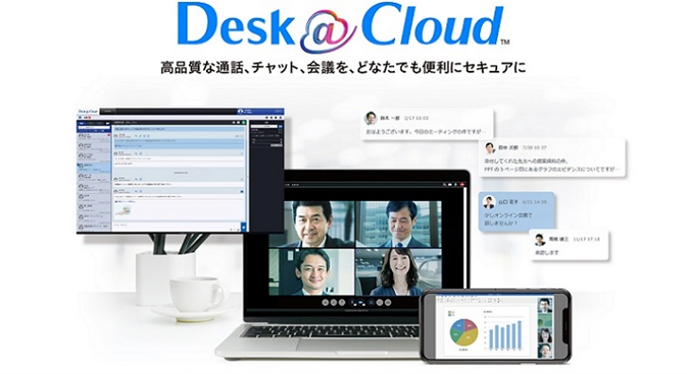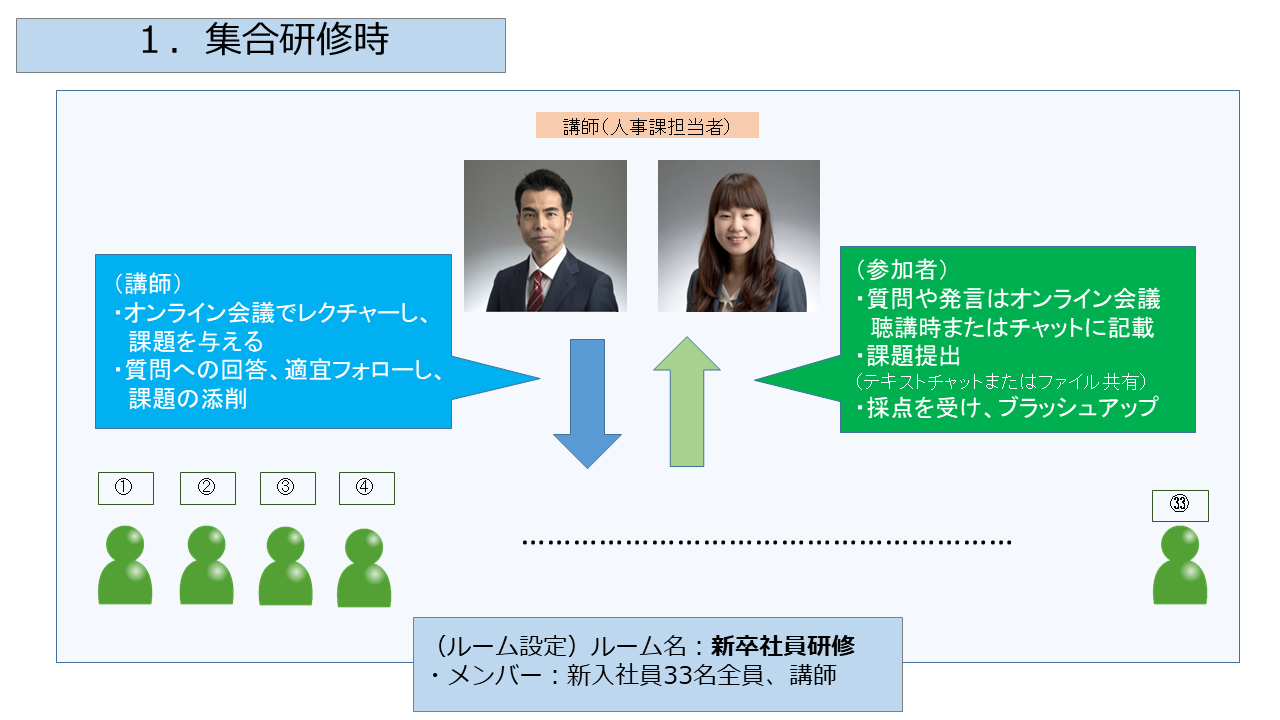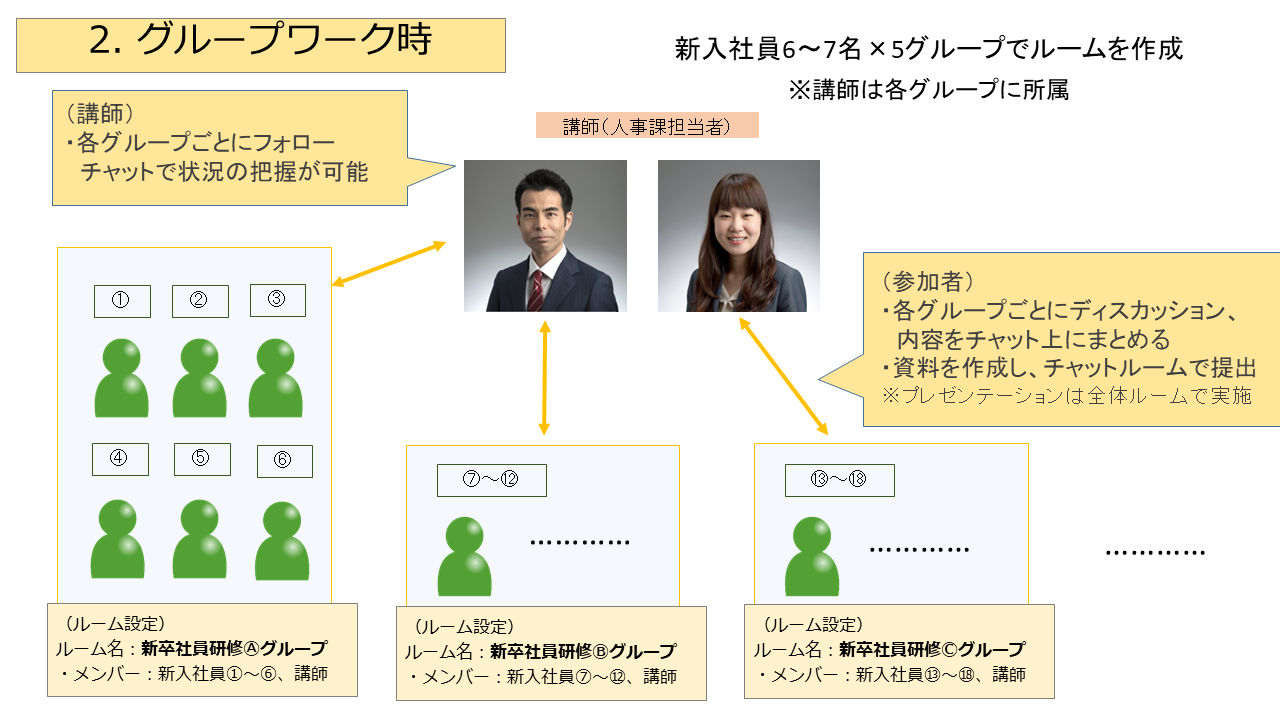Press Release
July 5, 2021
Digital Arts, Inc.
Internal case studies Digital Arts' chat and online conference system
100% of organizations that have implemented telework are willing to continue teleworking despite experiencing incidents.
- The unique business communication tool behind a remote work rate of 93.6% -
Information security solutions provider Digital Arts Inc. (headquarters: Chiyoda-ku, Tokyo, Japan; CEO: Toshio Dogu; hereinafter referred to as "Digital Arts"; Code 2326) is pleased to announce the release of internal case studies of its proprietary chat and online conference system, Desk@Cloud.
Launched in 2020, Desk@Cloud became the single source of internal communications system for Digital Arts and allowed the company to achieve a remote work rate of 93.6%.

The chat and online conference system Desk@Cloud was released on October 1, 2020. In order to prevent the spread of COVID-19, Digital Arts made remote work a general rule in April 2020. As a result, there was a growing desire to develop in-house tools that support operational efficiency, balance security measures and invigorate business communication. As such, we developed an in-house communication tool.
Desk@Cloud is a tool that allows you to easily and frequently carry out internal and external communications in a near face-to-face way. Desk@Cloud has a variety of text chat functions and has been designed to allow you to effortlessly hold web conferences, making everything from simple conversations within your company to making quick decisions possible.
By integrating internal communications into Desk@Cloud and using it to provide smooth communication, Digital Arts achieved a remote work rate of approximately 93.6% as of April 1, 2021,
Features of Desk@Cloud
- Anyone can hold a one-on-one conversation or an online meeting with up to 50 people smoothly with a simple UI (user interface). The tool also includes features such as desktop and file sharing, a whiteboard, virtual backgrounds and background blurring.
- Users can chat with a variety of members, from one-on-one to group rooms. Users can use the various search functions, bookmarks, instantly check the status of unread and read messages, and even attach and save files in chat rooms.
- Digital Arts' status as a security solutions provider means chats and online meetings are secure. The tool provides security features that align closely with customer needs, such as misdirection prevention, the ability to delete messages, linking with the file encryption and tracking solution FinalCode, and IP address restrictions.
Case study of Desk@Cloud Being Used Internally to Enhance Communication
When we began allowing remote work, one of the major issues we faced was the decreased opportunities for internal communication. As a result, Digital Arts notified its employees that they must actively communicate using Desk@Cloud. In addition to speeding up business communication, we thought it was important to consciously create opportunities for employees to communicate with each other and to prevent employees from feeling isolated while working from home. This lead to many Digital Arts employees being able to carry out their work without feeling any adverse effects on communication-the most significant challenge of working from home.
Out of such cases, we have provided case studies where Desk@Cloud was particularly effective. Below are case studies from the sales department, which handles project management and internal communication for approximately 90 sales staff in seven locations across Japan, and the human resources department, which conducted the first fully online training of new employees.
(1) Sales department: Hurdles in internal communication have been lowered, and simple exchanges have become smoother.
There are two main types of communication in sales: business negotiations and meetings with customers outside the company, and communication within the company and with each department. While concerned about how to handle these two types of communication, we began using Desk@Cloud. Until then, there were various restrictions on the use of video conferencing systems, such as reserving one of the company's only video conferencing systems for meetings between the head office and other offices or between offices.
Currently, Desk@Cloud is used twice a day internally, first in the morning and then in the evening, for meetings (morning and evening meetings) to discuss work reports and progress in each section and sales offices. In addition, meetings with the SE in charge of individual projects, and meetings with other departments, such as the development and marketing departments, are held several times a day. This is in addition to business negotiations with external customers.
In the past, it took a lot of time to prepare for even a small meeting, such as booking a meeting room and securing time, but with Desk@Cloud, it has become easier to ask questions such as if someone has a minute. Chats being able to be viewed on smartphones also lowered hurdles in internal communication. With Desk@Cloud, exchanges such as "I want to consult with you" and "Please take a look at these documents" have become effortless. Also, since groups can be created for each project, all exchanges and documents such as chat texts and shared files are recorded, making it easy to find things. Only the sales team visits customers in person, while the SEs connect via online conference. Explanations and sales pitches are effortlessly supplemented through sharing the management screen.
(2) Human resources division: First full online training under remote work Pivoting to a curriculum that utilizes the online environment and emphasizes output
In the past, face-to-face training was the primary way new employees were trained, but in 2020, training had to be hastily conducted online. For this reason, the curriculum was changed to be more output-oriented to utilize the fact that the training was online.
The biggest advantage of online training is that group work can be more active and bring out participants' ability to take initiative. The program didn't end with simple lectures. Participants discussed in teams, used the internet to look up things they did not understand, summarized what they had learned, and presented it to the other participants. This lead to communication being more active than usual as in real life, the main focus is on conversation, while online, both conversation and chat can be used. We also found that we could do these tasks more quickly online, which made the presentation more complete and accelerated the participants' actions. Since Desk@Cloud allows anyone to create chat rooms, new employees have started to voluntarily create groups to work on issues.
In addition, instructors were able to provide feedback by pointing out things using Desk@Cloud's screen sharing function, a feature unique to online meetings. The training was ultimately more efficient than face-to-face training. It seemed easier to ask questions in chat than face-to-face, and overall responses increased. Furthermore, in face-to-face sessions, communication between instructors and new employees tends to be one-way, but online, it is easier to get responses and observe the interaction between new employees, which makes it easier to follow up.
For human resources, real-time training, such as the content of question-and-answer sessions, is recorded in "Desk@Cloud," which accumulates information on new employees for one year from the time they join the company, helping them prepare for the next year. Growth can also be seen in the exchanges and progress of chat rooms, making it easy to be shared as knowledge.
In this way, actions that would have been limited to the scope of the materials in conventional group training or even in face-to-face lectures are now more diverse online, and the accuracy of new employees' output has been improved. This is a benefit of training that takes advantage of the Desk@Cloud feature that allows for instant online meetings from the chat room.


See here for detailed internal case studies of Desk@Cloud.
Sales Department Case Study:
https://www.daj.jp/bs/lp/desk_case/sales/
Human Resources Department Case Study:
- Digital Arts Inc. Overview
- Digital Arts Inc. is an information security solution provider focused on the development and sales of security software for web, e-mail, files and other uses.
Since its founding in 1995, the company philosophy has been "Contributing to a safer, better, more convenient internet lifestyle" and since developing web-filtering software to prevent the browsing of harmful information on the internet, the company has been promoting internet security products to companies, the public sector and homes everywhere.
https://www.daj.jp/